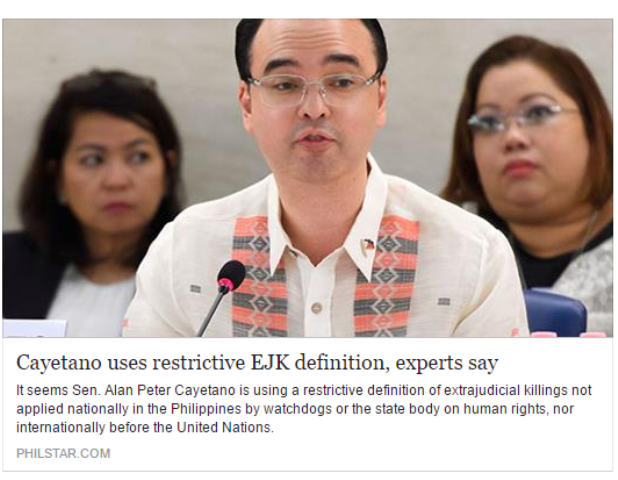Countering the Restrictive Definition of EJKs

Screengrab from the Philippines Star’s Facebook account.
TWO ONLINE publications have refuted a statement made by Foreign Secretary Alan Peter Cayetano before the United Nations Human Rights Council (UNHRC) in defense of the Duterte administation’s war on drugs. The former senator had accused the media and critics of President Rodrigo Duterte of tarnishing the administration’s image abroad by changing the definition of extrajudicial killings (EJKs) and labelling them as “vigilante killings” which occur outside legitimate police operations.
Cayetano cited Administrative Order 35, which defines EJKs as killings of members or advocates of cause-oriented organizations or of the media. The order, which was signed in 2012 by then President Benigno Aquino III, created an Inter-Agency Committee (IAC) to monitor cases of extralegal killings, enforced disappearances, torture, and other grave violations of the rights to life, liberty, and security.
Countering Cayetano’s claim, Philstar.com reported in “Cayetano uses restrictive EJK definition, experts say,” that according to human rights advocates, the secretary’s use of A.O. 35 is restrictive and inapplicable. Rose Trajano, secretary general of Philippine Human Rights Advocates, recalled a 2008 court ruling which defined EJKs as “killings committed without due process of law.” Trajano pointed out that the Supreme Court was prompted to issue a definition following cases of politically motivated killings during the administration of President Gloria Macapagal Arroyo. The definition in A.O. 35, according to Human Rights Commissioner Karen Gomez Dumpit, “represents a prioritization of extrajudicial killings that were happening at that time.” CHR spokesperson Jacqueline de Guia added that the administrative order’s definition of EJKs is applicable only to the IAC.
Another online article, “Was the definition of EJKs changed under the Duterte administration?,” published by VERA Files, noted that there is no existing law which defines EJKs. The article also provides definitions of summary and arbitrary executions from the Office of the High Commissioner for Human Rights (OHCHR) and the UN Special Rapporteur.
Providing information that would help the public make well-informed decisions is one of a journalist’s foremost responsibilities . It becomes even more important when the discussion centers on human rights and and there are attempts to push “alternative facts.”
Leave a Reply